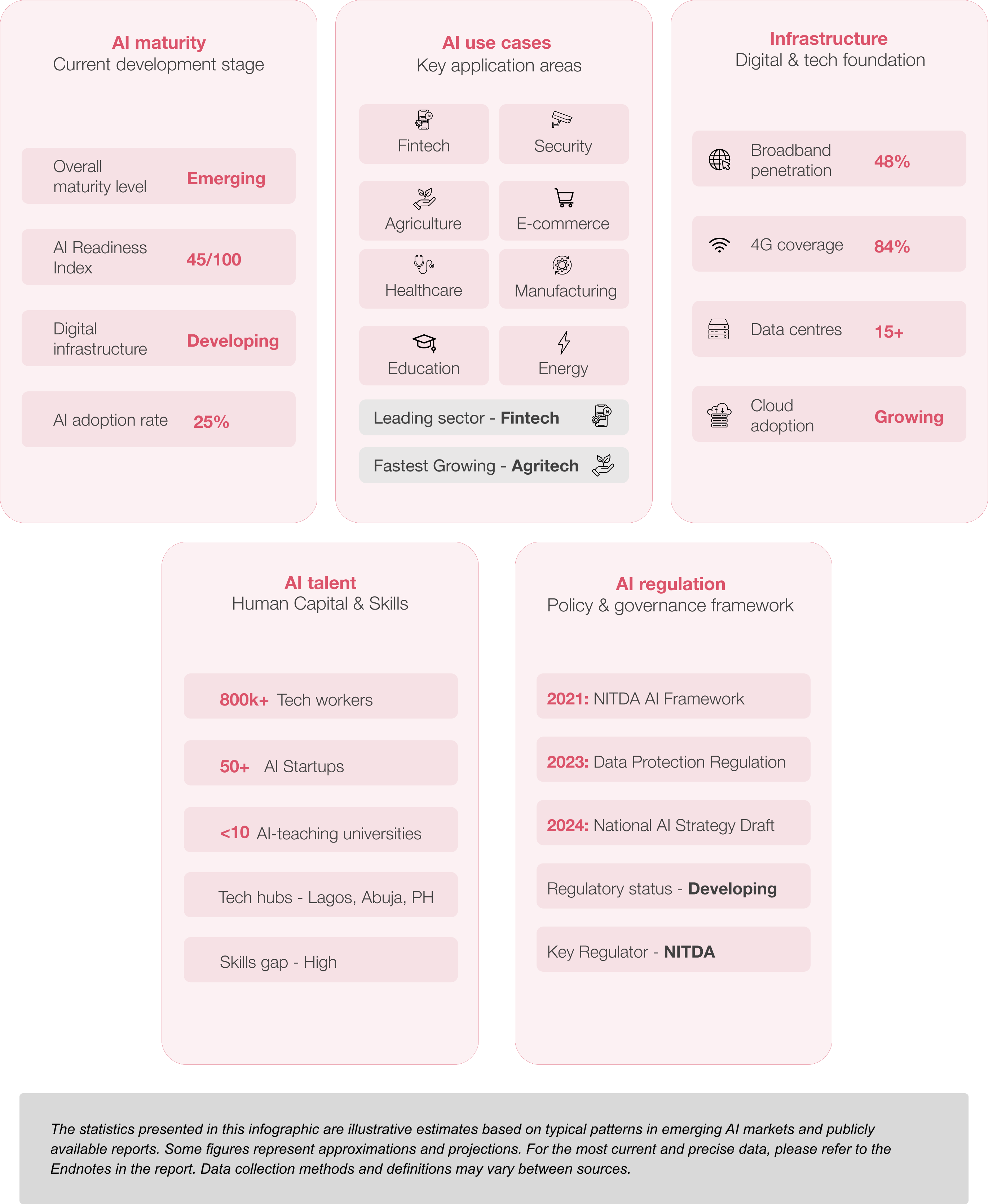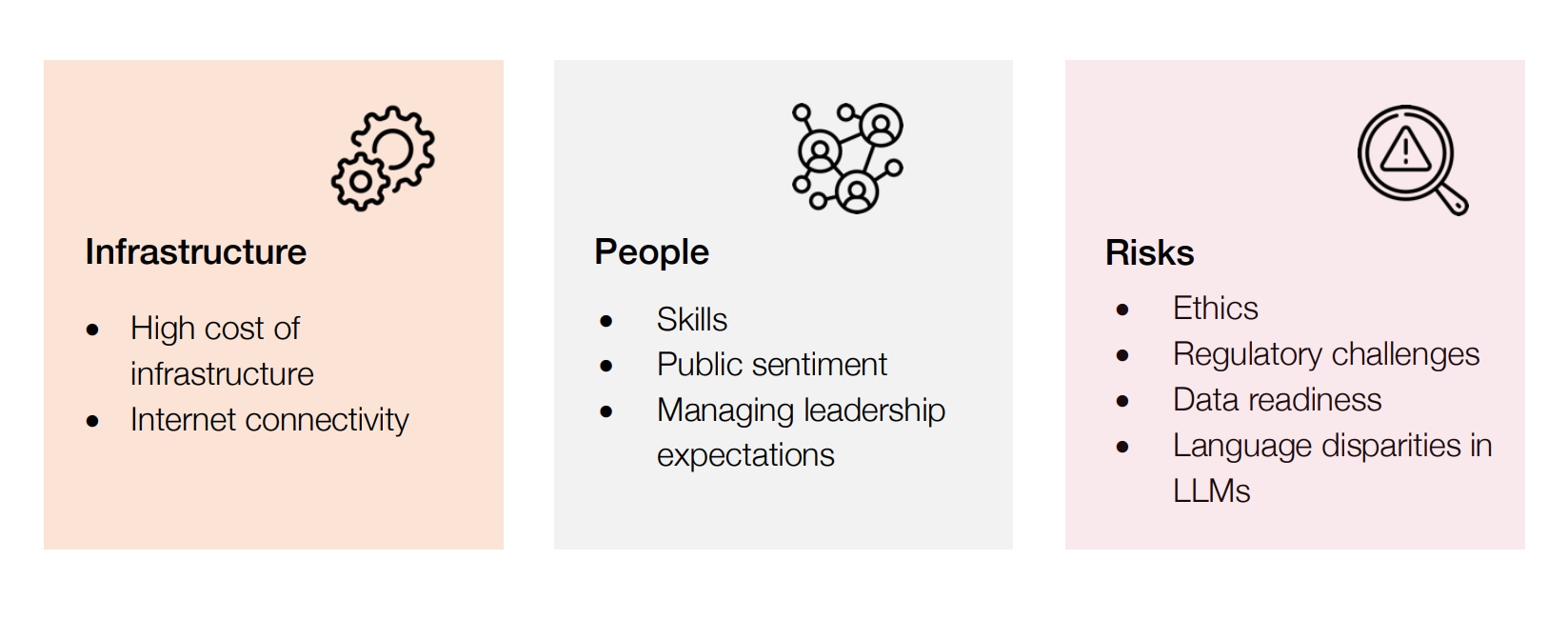Artificial intelligence is reshaping the global economy, with generative AI (GenAI) marking a significant leap in accessibility and impact. While traditional artificial intelligence has long driven progress in data analysis, automation, and predictive modelling, GenAI represents a significant leap forward in the democratisation of technology. By removing the need for specialised expertise, it enables a broader range of people to access and benefit from powerful tools simply through natural language interaction.
AI is set to revolutionise the global economy, transforming industries, enhancing productivity, and fostering innovation. According to a PwC report, AI is expected to contribute up to $15.7 trillion to the global economy by 2030. Often compared to transformative inventions like electricity and the printing press, AI could reshape how we live, work, and innovate. It's already powering breakthroughs across healthcare, finance, manufacturing, and communication.
For Nigeria, AI represents more than just a technological shift; it is a strategic opportunity to accelerate inclusive growth, enhance public services, and position the country as a digital leader on the African continent.
This whitepaper, a collaborative effort by PwC Nigeria, Lagos Business School (LBS) and Microsoft, explores the current state of AI in Nigeria, highlights key opportunities for adoption, and presents recommendations to accelerate its responsible and inclusive integration.
AI adoption in Nigeria
Artificial intelligence remains an emerging field in Nigeria, but recent years have seen a notable shift in awareness, investment, and application. Spurred by global advancements and a growing recognition of AI’s transformative potential, Nigerian entrepreneurs, researchers, policymakers and investors have begun to explore how intelligent technologies can address local challenges and drive inclusive economic growth.
The Nigerian government, for example, has launched several initiatives to support innovation and capacity-building. These include the Nigeria Artificial Intelligence Research Scheme (NAIRS) and the National Centre for Artificial Intelligence and Robotics (NCAIR), both of which provide funding, infrastructure, and technical support for AI-driven projects. Most recently, the government unveiled its National AI Strategy, which outlines a vision for leveraging AI to enhance economic competitiveness, promote social inclusion, and position Nigeria as a leader in technological innovation.
The private sector, particularly startups, is also a driving force in Nigeria’s AI ecosystem. From healthcare to agriculture, local innovators are deploying AI-powered solutions to improve service delivery, optimise operations, and enhance decision-making.
Overview of AI Adoption

Challenges of AI Adoption in Nigeria
AI presents many new opportunities and risks. The opportunities are evident in the widespread adoption of AI, increased funding for AI startups, and the benefits reported by businesses using AI. While this technology promises to reimagine many facets of daily life, it also presents a unique set of hurdles that Nigeria must surmount to enhance its AI prowess. These challenges span across three key dimensions: Infrastructure, people and risks.

High cost of AI infrastructure
AI adoption demands significant financial investment in both computational hardware and data storage infrastructure. Hardware like High-performance GPUs (Graphics Processing Units) are essential for training complex AI models, as they provide the computational power needed to process large datasets and perform intricate calculations. However, these GPUs are expensive, making it difficult for many organisations, especially in developing regions, to afford them.
Additionally, storing the vast amounts of data required for AI applications demands extensive storage solutions, which further increases costs. These financial barriers can hinder the widespread adoption of AI, as many entities may struggle to secure the necessary resources to implement and maintain AI technologies effectively.
Skills
A major barrier to AI adoption in Nigeria is the shortage of skilled professionals who can navigate its technical complexity. Developing and deploying AI systems requires expertise in areas such as machine learning algorithms, data engineering, and model optimisation—skills that are in short supply locally. This gap is further widened by the emigration of trained professionals, creating a talent vacuum. For aspiring professionals, the steep learning curve and lack of accessible, high-quality training can be discouraging. Together, these factors contribute to a persistent skills deficit that slows the growth of Nigeria’s AI ecosystem.
However, initiatives like the Federal Ministry of Communication and Digital Economy’s 3MTT (Three Million Technical Talent) program, Microsoft AI Skill Navigator, and other programs are gradually growing the next generation of AI talents and working to fill the skill vacuum. Given Nigeria’s substantial youth population, both public and private enterprises have a unique opportunity to fully leverage AI's advantages. By addressing the current gap in advanced data science skills, these enterprises can harness AI's full potential and drive significant progress.
Ethics and governance
One of the primary ethical concerns is bias in AI systems, which can perpetuate existing social inequalities if they are trained on biased data sets. Ensuring transparency in AI decision-making processes is also crucial, as it enables stakeholders to understand how AI-driven conclusions are reached, thereby building trust and accountability.
Another aspect is data protection and privacy. As AI systems rely on vast amounts of data, often including sensitive personal information, ensuring that this data is safeguarded is vital. Nigeria has taken steps in this direction by establishing the Nigeria Data Protection Regulation (NDPR), which provides guidelines for the collection, processing, and storage of personal data.
Regulatory challenges
Nigeria's AI landscape is characterised by a lack of robust regulation, leaving society vulnerable to potential risks of misuse. Currently, AI regulations are fragmented across various regulatory bodies, resulting in confusion, overlap, and a lack of cohesion.
Recommendations
Encourage digitisation across sectors
To fully harness the potential of AI, Nigeria must prioritise digitisation across sectors, generating a comprehensive dataset to drive innovation. Encouraging a digital-first mindset by promoting digitisation at the tertiary level can yield significant benefits. For instance, making it mandatory for students to digitise projects or materials can provide sectors with innovative solutions to pressing challenges.
Collaborate with corporate bodies on sensitisation among professionals: Partnering with professional bodies such as the Institute of Chartered Accountants of Nigeria (ICAN), The Nigerian Medical Association (NMA) etc., can help raise awareness and understanding of AI among professionals. These collaborations can include workshops, seminars, and training sessions that highlight the benefits and applications of AI in various industries
Make AI courses free on online platforms: Providing free access to AI courses on online learning platforms can democratise AI education. This initiative would allow a broader audience to gain essential AI skills, regardless of their financial background. By removing financial barriers, the government can foster a more inclusive and skilled workforce capable of leveraging AI technologies.
Include AI in school curricula: Integrating AI into the school curriculum from an early age can empower students with essential skills and knowledge for the future workforce. While pursuing ambitious initiatives like integrating Coding and Robotics into tertiary education, the government can also explore smaller-scale yet high-impact projects, such as educating students on AI literacy, including effective AI tool usage, prompt engineering, and AI-facilitated research skills
Contact us







